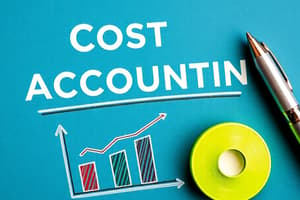Podcast
Questions and Answers
What primary components do mixed costs contain?
What primary components do mixed costs contain?
- Only fixed costs
- Only variable costs
- Costs that are variable but considered fixed for budgeting purposes
- Both fixed and variable costs (correct)
Which costing method focuses on costs throughout the product's entire life cycle?
Which costing method focuses on costs throughout the product's entire life cycle?
- Life Cycle Costing (correct)
- Target costing
- Activity-Based Costing
- Value Engineering
What type of costs are considered relevant in decision-making?
What type of costs are considered relevant in decision-making?
- Inflated costs predicted for future periods
- Past costs that cannot be altered
- Costs that remain unchanged regardless of alternatives
- Future costs that differ between alternatives (correct)
Cost leadership strategies primarily focus on what aspect?
Cost leadership strategies primarily focus on what aspect?
What is a common method used to evaluate organizational performance over time?
What is a common method used to evaluate organizational performance over time?
Which statement best describes the goal of cost management?
Which statement best describes the goal of cost management?
What distinguishes direct costs from indirect costs?
What distinguishes direct costs from indirect costs?
Which method is not typically used for cost estimation?
Which method is not typically used for cost estimation?
What is the purpose of variance analysis in cost control?
What is the purpose of variance analysis in cost control?
How do fixed costs behave as activity levels change?
How do fixed costs behave as activity levels change?
Which of the following is an example of a variable cost?
Which of the following is an example of a variable cost?
What is the key outcome of effective cost control?
What is the key outcome of effective cost control?
Which type of cost analysis helps in understanding the impact of activity level changes?
Which type of cost analysis helps in understanding the impact of activity level changes?
Flashcards
Cost Management
Cost Management
The process of planning, controlling, and reducing costs in an organization.
Cost Accounting
Cost Accounting
Detailed recording and analysis of costs related to products or services.
Direct Costs
Direct Costs
Costs that can be directly traced to a specific product or activity.
Indirect Costs
Indirect Costs
Signup and view all the flashcards
Cost Estimation
Cost Estimation
Signup and view all the flashcards
Budgeting
Budgeting
Signup and view all the flashcards
Cost Control
Cost Control
Signup and view all the flashcards
Cost Behavior Analysis
Cost Behavior Analysis
Signup and view all the flashcards
Mixed Costs
Mixed Costs
Signup and view all the flashcards
Activity-Based Costing (ABC)
Activity-Based Costing (ABC)
Signup and view all the flashcards
Relevant Costs
Relevant Costs
Signup and view all the flashcards
Cost Leadership Strategy
Cost Leadership Strategy
Signup and view all the flashcards
Life Cycle Costing
Life Cycle Costing
Signup and view all the flashcards
Study Notes
Cost Management Concepts
- Cost management is the process of planning, controlling, and reducing costs within an organization. This applies to all types of businesses.
- The goal is to optimize resource utilization, enhance profitability, and improve overall efficiency.
- Core aspects include cost accounting, budgeting, and variance analysis.
Cost Accounting
- Cost accounting involves the detailed recording and analysis of costs associated with products, services, or activities.
- Direct costs are directly traceable to a specific product or activity (e.g., direct materials, direct labor).
- Indirect costs are not easily traced (e.g., factory rent, utilities). These are often allocated based on predetermined bases (e.g., machine hours).
- Cost accounting systems help managers understand production or service delivery costs.
Cost Estimation and Budgeting
- Cost estimation approximates future costs for various activities.
- Methods include: historical data analysis, engineering estimates, statistical methods (e.g., regression analysis), and analogy methods.
- Budgeting formally plans future costs and revenues.
- Budgets often incorporate sales forecasts, production schedules, and other financial data.
Cost Control and Variance Analysis
- Cost control monitors and evaluates actual costs against planned costs to ensure alignment.
- Variance analysis compares actual cost to planned/budgeted cost.
- Investigating the cause of variances is crucial (e.g., a labor rate variance identifies labor performance).
- Understanding variances guides corrective action and cost optimization.
Cost Behavior Analysis
- Cost behavior analysis examines how costs change with activity levels, vital for decision-making, pricing, planning, and budget control.
- Costs are classified as fixed, variable, or mixed.
- Fixed costs remain constant regardless of activity level (e.g., rent).
- Variable costs change proportionally to activity level (e.g., direct materials).
- Mixed costs have both fixed and variable components (e.g., utilities); separating components is crucial for analysis.
Cost Management Techniques
- Activity-Based Costing (ABC): Allocates overhead costs based on activities, not volume.
- Target costing: Sets a target cost based on projected market price and desired profit margin.
- Life Cycle Costing: Evaluates costs throughout a product's entire life (research, development, disposal).
- Value Engineering: Systematically improves product/process functionality or design without compromising quality to enhance cost or efficiency.
Relevant Costs in Decision-Making
- Relevant costs in decision-making are future costs differing between alternatives.
- Irrelevant costs remain the same regardless of the decision.
- Focusing on relevant costs enables accurate decision-making.
Cost Structure and Competitive Strategy
- Cost structure (fixed vs. variable costs) significantly impacts competitive strategy.
- Cost leadership strategies aim for lowest industry costs.
- Differentiation strategies emphasize unique product/service features at a premium price.
- Cost structures influence pricing and profitability models.
Cost Management and Performance Evaluation
- Cost management evaluates departmental or organizational performance.
- Key performance indicators (KPIs) monitor progress and success.
- Benchmarking against competitors is a common metric.
- Performance-based compensation can motivate cost-cutting or cost-management initiatives.
Studying That Suits You
Use AI to generate personalized quizzes and flashcards to suit your learning preferences.




